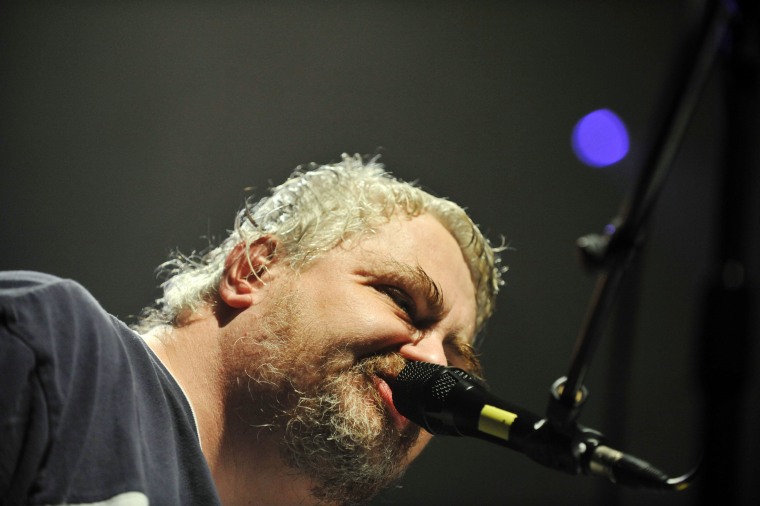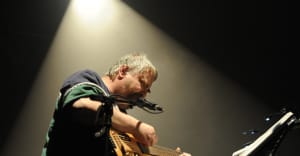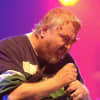 Alain Jocard/AFP/Getty Images
Alain Jocard/AFP/Getty Images
In Austin, you can’t escape Daniel Johnston’s frog. With its Buddha-like crouch and alien eyes, the little guy on the cover of the late singer-songwriter’s 1983 album Hi, How Are You is scattered across the city on T-shirts, buildings, and welcome mats. It’s a metonym for Johnston’s relationship to Austin — the place that first embraced his boiled, broken pop songs and unpredictable behavior that were symptoms of Johnston’s mental illness. After his tragic passing last week, the murals and paraphernalia celebrating Austin’s favorite son further supports what Daniel’s songs hinted at: These moments are bigger than us, and they’ll remain long after we have left.
The exact date and circumstances of Johnston’s arrival in Austin are up for debate, but it’s generally agreed upon that he showed up around 1985. He was kicked out of a carnival or circus in San Marcos (about an hour south of Austin proper), and migrated north; according to one legend, Johnston was taking too long in a port-a-potty and someone tipped the thing over while he was still in it. He called it quits and headed for Texas’ capital, and one of the first places he announced his presence was at the Austin Chronicle office, where co-founder and editor Louis Black (who also co-founded South By Southwest) was working.
Johnston showed up with a tape and insisted that Black play it; when similar situations occurred in the Chronicle office, Black would pass the music along to a critic to listen at a later date. This time, however, Daniel stuck around until Black listened to the record. “Unlike any other time, I put it on, and I listened to the whole tape. I was knocked out,” he explains to The FADER from his home office in Austin’s Hancock neighborhood. Black has a dozen similar stories about Johnston just like this, but as one of the first fans of his quirky style, he also became a confidant of sorts — one of the few people who were a witness to Johnston’s many sides. As a support system, Black was able to see something many fans of his music were unable to: a human deeply struggling to connect with the outside world.
Besides his recorded work, Johnston’s legacy lives in storytellers like Louis Black and the Chronicle staff, as well as their coverage of the Austin scene in the ‘80s and ‘90s. These memories persist almost everywhere you look — it all lives on with the frog.
Talk about the time you first met Daniel.
It was a Saturday in 1984. We only had one computer at the Chronicle at that point, and I was by myself working. I heard a shuffling outside the door. It wasn’t a knock, but it kept going on and on. Finally, I went over to the door and there’s this kid standing there. He says, “I’m Daniel Johnston,” and he hands me a cassette. I said, “If any of the reviewers like it, maybe they’ll write something about it, but I’m not making any promises.” I went back to writing, and the shuffling continued. I go back to the door, and Daniel’s still standing there. He says, ”Oh, no. This isn’t for the reviewers, it’s for you.” Later on, he made a comic strip about this meeting, and in the last panel, while he’s saying “It’s for you…,” there’s a thought bubble above his head that says, “He’s buying it.” [Laughs] And I did!
Did his popularity in Austin grow after that?
People started talking about him all over town. A lot of people were listening, and I played it for everyone I could. I played it for all the music writers and Margaret Moser. Some people dug it and some people didn’t. But he was spreading pretty quickly around town.
Did he play shows early on?
He started opening for Glass Eye. I don’t think I was at the first show, but I was at the second or third. He’d get up and do three songs, and they were some of the most brilliant performances I’ve ever seen — partly because he was an absolute pain. He was tearing things up on stage and then he’d run and hide afterwards. He could play piano, but because Austin’s a guitar town, he played guitar. It was like nothing I’d ever seen. He played a song called “Marching Guitars” which is about how music is dated by these big guitars. He was this kid in the middle of a guitar band era doing weird folk music. People talked during his sets, but more and more they started listening. [Austin Chronicle co-founder] Nick Barbaro was at a bar one night, and Daniel was talking to some girls. He told them, “I’ve been critically acclaimed,” pointed at Nick and [late Austin Chronicle critic] Richard Dorsett and said, “And there are the critics that acclaimed me!”
How did your friendship with him grow from there?
The thing that people miss is that Daniel was never one person. He was always exploiting and conning you, but he was also naïve and innocent. At the same time, he knew everything that was going on. Sometimes we’d have really sweet conversations, but generally when he called me, he’d have me smashing the phone handle on the desk within a minute. He was always asking me to put him on the cover of the Chronicle. But we were very friendly. We saw each other all the time, and I thought his work was great. When I found Yip Jump Music and Hi, How Are You, I thought they were masterpieces.
What was it about those early records that appealed so intensely to people in Austin?
His writing. Austin is a songwriting town, and his songs were amazing. There are so many brilliant lyrics. When he performed them, they were on target and painful. It was really honest. The songs blew me away. About a year ago, Daniel’s brother Dick told me, “Daniel’s audience keeps growing.” A lot of guys who started when Daniel did now have audiences in their 40s or 50s. Daniel is constantly being discovered by younger generations, and it’s because he speaks to people in a really unique way. A lot of people feel really alone until they meet Daniel.
How did you navigate your love of his songs with the mental illness he lived with?
When somebody goes crazy on you, it’s scary. I always thought I could be a best friend to an artist with these issues, but it’s not the case. After we committed Daniel for the first time, I was always the one grabbed if someone had a breakdown, because people thought I knew what to do and I talked to Daniel. I didn’t get romantic about it — I got him to a doctor as quickly as possible and let the doctor do the rest, because short of that, there was a chance he was going to do harm to himself.
In [the 2005 documentary The Devil and Daniel Johnston], I talk about how he was brilliant but he was also crazy. A few reviewers wrote, “Louis made a classic mistake in thinking that just because he was crazy he was also brilliant.” I was so pissed at that. I actually wrote to these critics, because I had fallen in love with Daniel’s music long before I realized how unstable he could be. That was certainly not the attraction. It pissed me off, because they clearly weren’t listening to Daniel and they had an attitude. They were missing this incredible work.
He performed at the MTV Cutting Edge Awards at one point.
He absolutely stole the show. At that point, his fame kept growing. David Byrne knew who he was, the Dead Milkmen covered him — he was a big deal. You passed his music to other people because there was no one else quite like him.
Talk about the first time he was institutionalized.
It was 1986. We just decided to start South By Southwest, and I had met the woman I was going to marry. It was just after Christmas, and I had a fever. The phone rings, and a kid says, “Do you know Daniel? You better come down here.” I said, “I have a fever — I’m not coming down there.” He called back and immediately said, “You better come down here.” He was on campus, near this running stream. He was in the middle of the stream, and his eyes were white — he was preaching. I kept trying to connect with him, but after a while I realized it was impossible. Eventually, the UT Police showed up and said, “He’s coming out of the water now. You can get him, or we can go get him, but we’re not gonna be in good moods about it.” We got him, handed him the cops, and the cops committed him.
Two days later, [Johnston’s manager] Jeff Tartakov gets him out, because he has this romantic view of Daniel, which pissed me off to no end. He asked a nurse how Daniel was doing, and the nurse said, “He’s doing well, but he’s suffering from two terrible delusions. One is the Russians are going invade Texas on New Year’s Day, and the second is that he’s going to be on MTV next week.” Jeff goes, “Well, I don’t know about the first one…”
How did you feel about him being loaded up with drugs and then released?
He never took responsibility for what he did, because he didn’t know. I don’t quite remember the sequence of events after he got out, but he was burning a lot of his things and at some point he beat Jeff up with a lead pipe and put him in the hospital. At that point, his parents got him and took him home to West Virginia.
In 1990, he played the Austin Music Awards, which led to his infamous plane crash. How did that chain of events happen?
I always asked his dad or his brother if I had requests for Daniel. Other people would call Daniel directly and try to make deals or take advantage of him. They agreed and Daniel’s dad flew him down in a small plane. He did a few in-stores at Waterloo Records. He was becoming very popular at this point so there were all these lines for these shows. He did the Music Awards, which was insane. He did an encore, which we didn’t do at that point. Half the audience was going crazy, and the rest of the audience was trying to figure out what he was doing.
One year at the AMAs he beat Townes Van Zandt for Songwriter of the Year. I love Daniel’s songwriting, but we’re talking about Townes Van Zandt. The next day, he’s flying back to West Virginia with his dad, and he’s reading a comic of Casper the Friendly Ghost. Casper’s friend on the cover is in a parachute. Daniel leans over, turns off the plane, and throws the keys out the window. Fortunately, his dad’s a very good pilot, but it still crashed. The authorities came and got him, filled him up with drugs, and took him to the mental hospital.
Was he writing during that period?
He was institutionalized a lot during that period, which was really scary. Somewhere in there, he stopped writing. In 1990, he was in the offices of the Chronicle. I asked if he was writing, and he told me he was. I was positive he wasn’t, so obviously I didn’t believe him. He sang me “Devil Town” a cappella, and it was one of the scariest moments of my adult life [Laughs]. Five years later, he was singing that song in a Berlin nightclub and everyone was singing along. I thought that was the end of human civilization as we knew it.
He often got in the way of his own success. Do you think he was self-sabotaging?
That’s almost too normal. He was always calling me up to tell me that I should reunite the Beatles so they could back him [Laughs]. He had so many visions at once, and some were at conflict with others. He was more than self-sabotaging, but he wrote these amazing songs. I don’t forgive an artist anything. Some of them are assholes. I can go pretty far though, because at least they’re creating something interesting. He was unique. It wasn’t that he had these debilitating issues, it was never about that. He was just an amazing songwriter.


